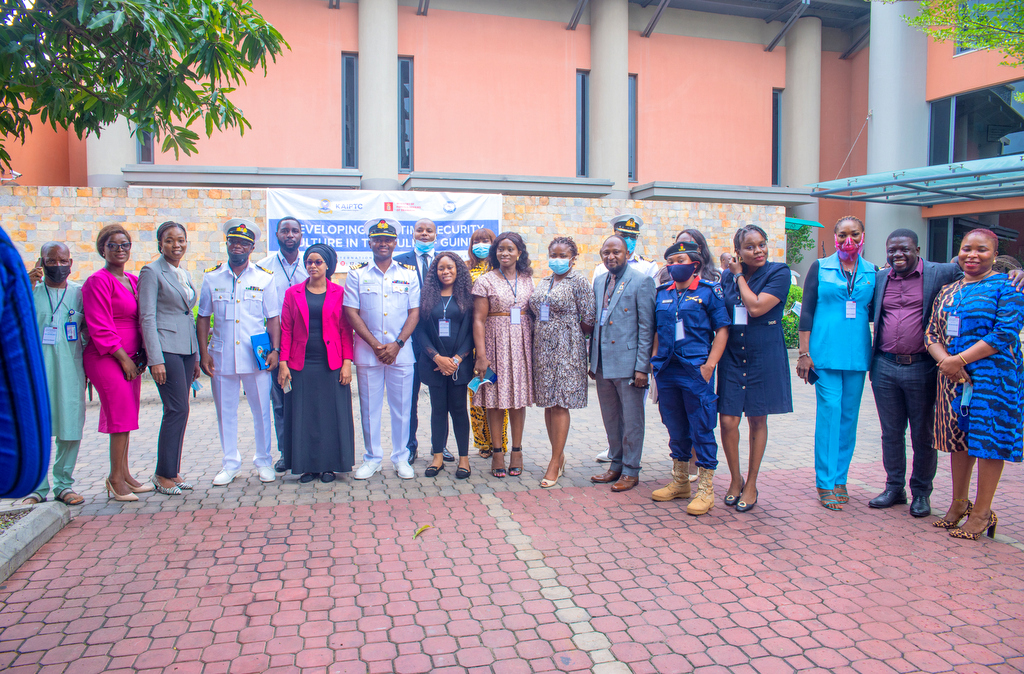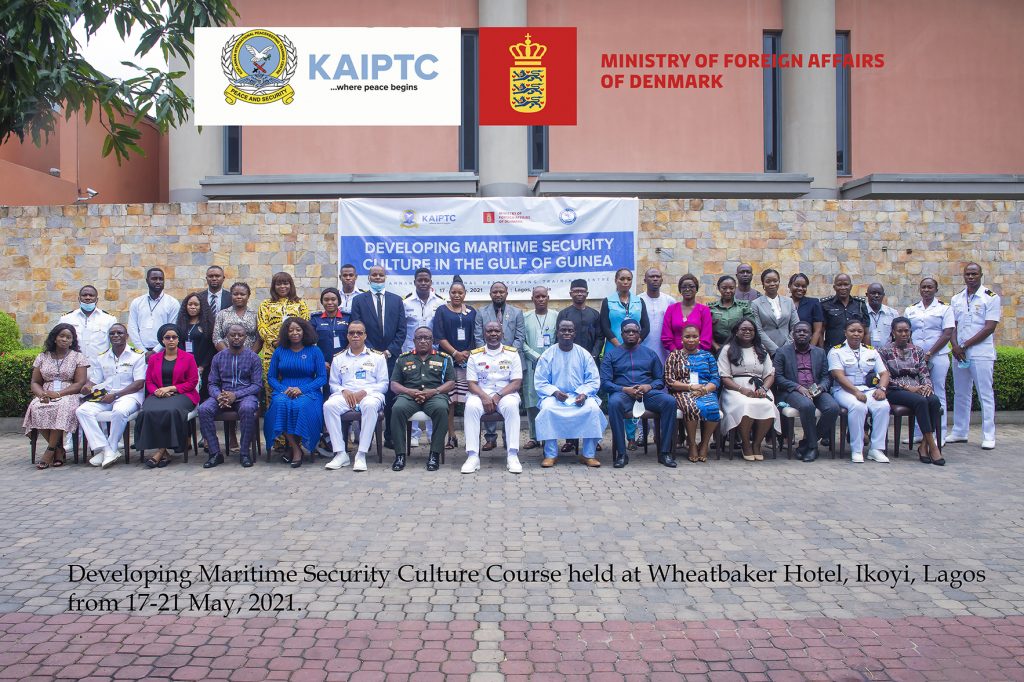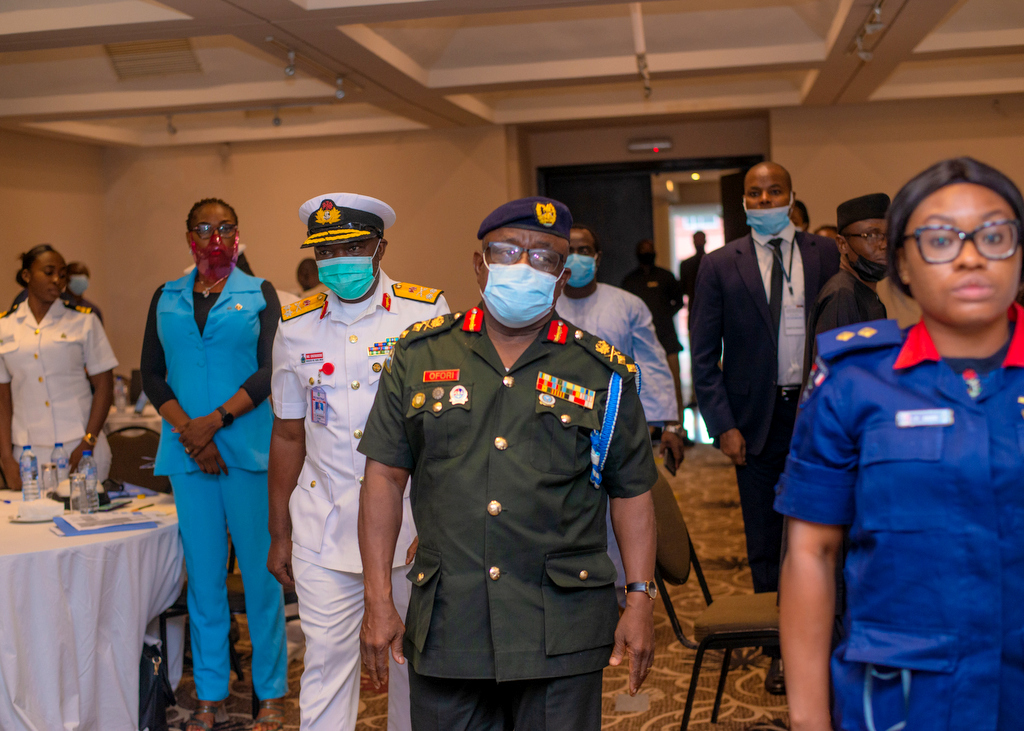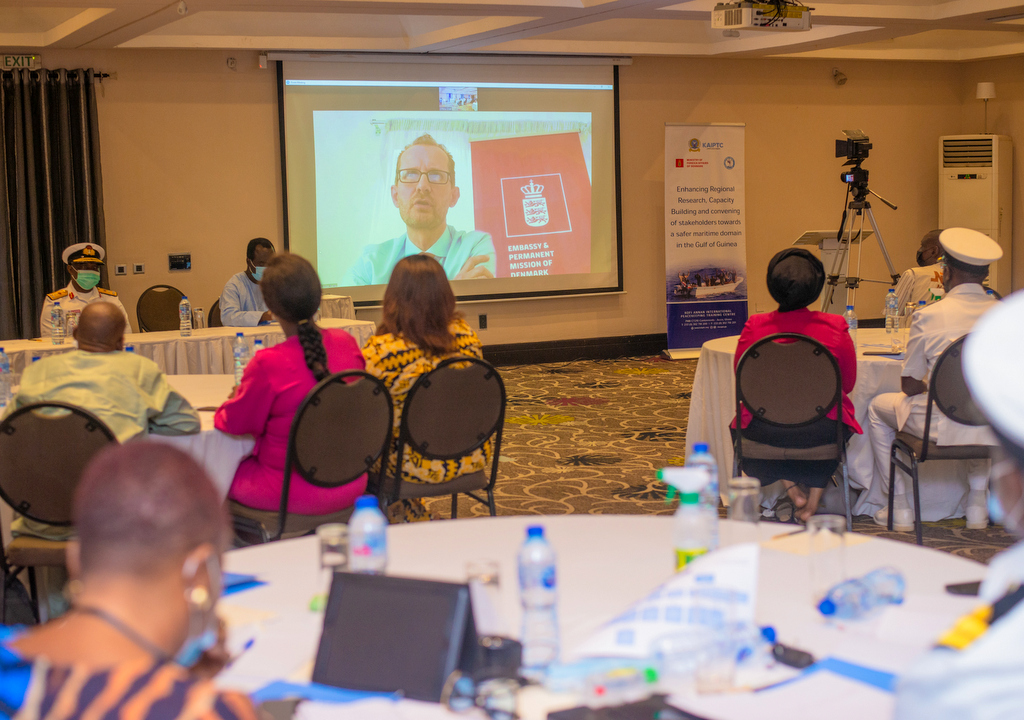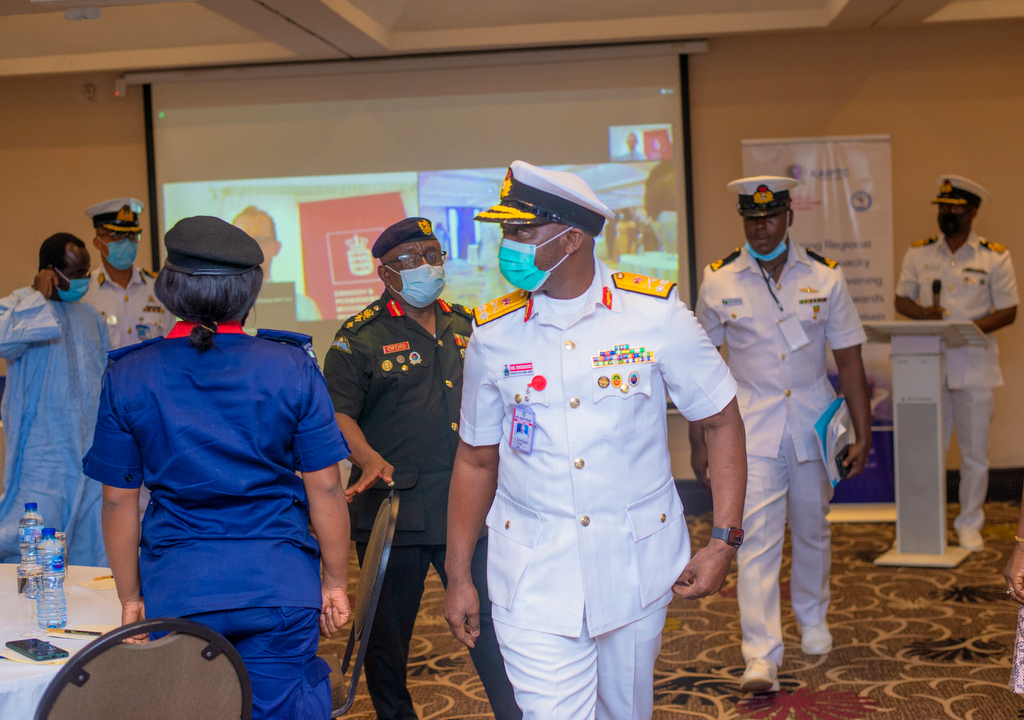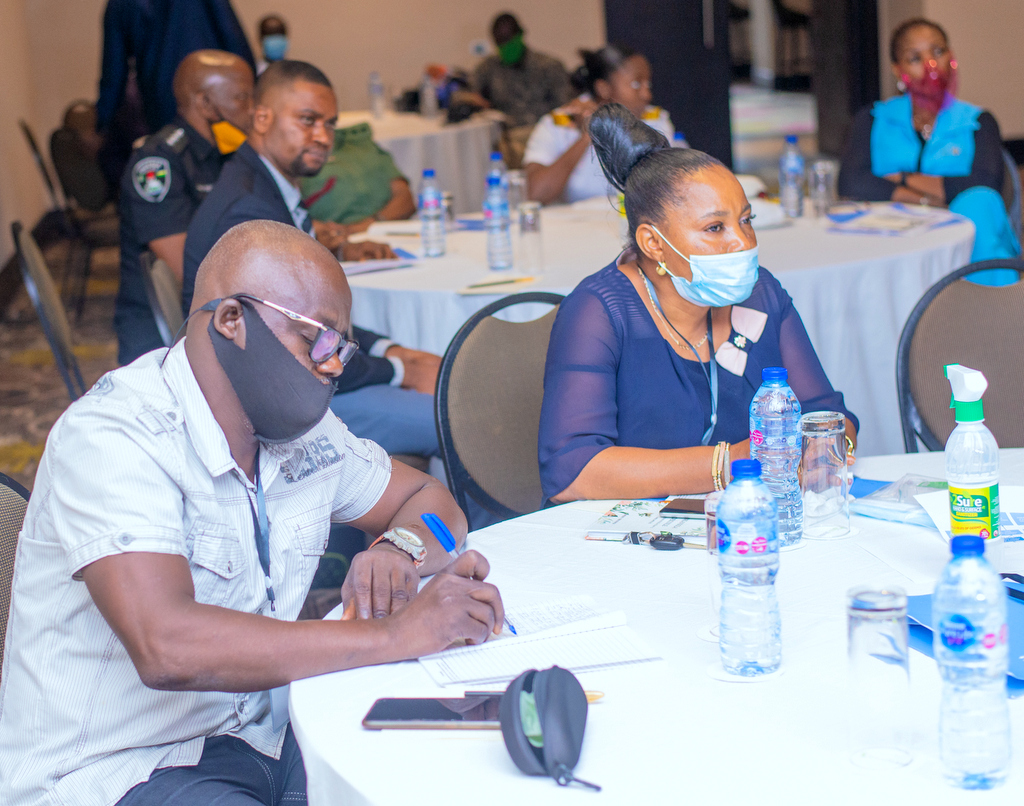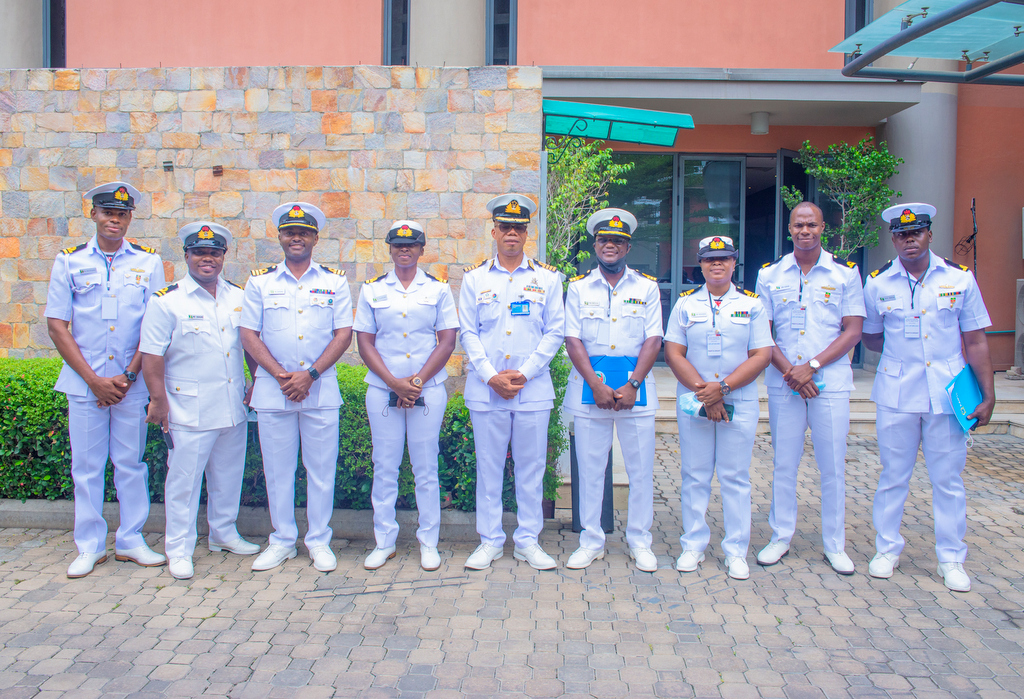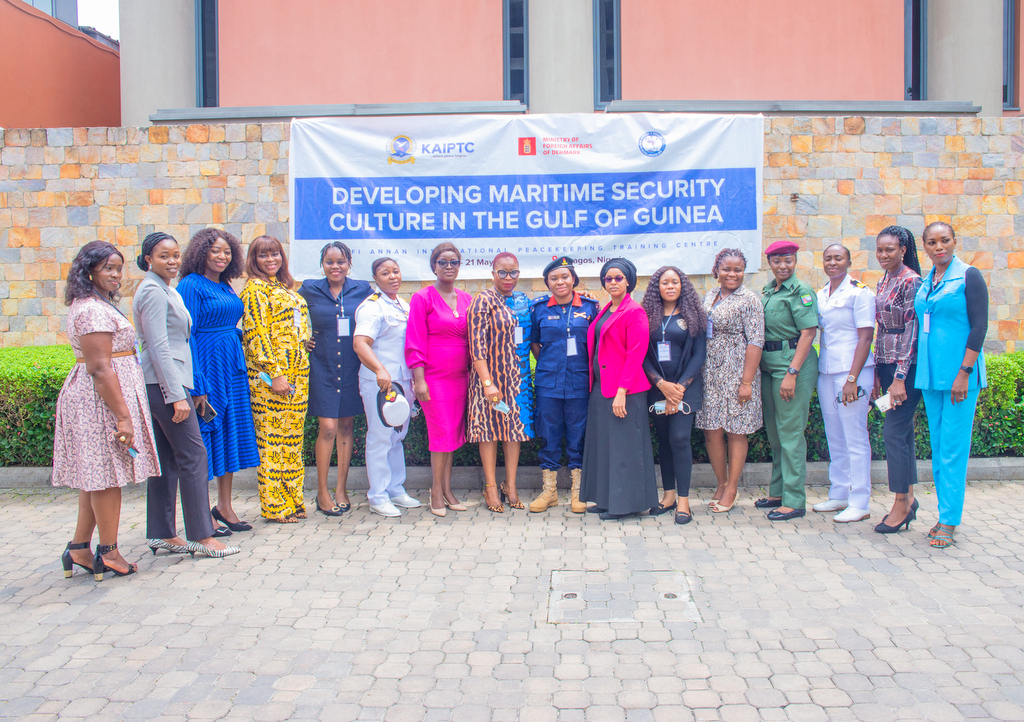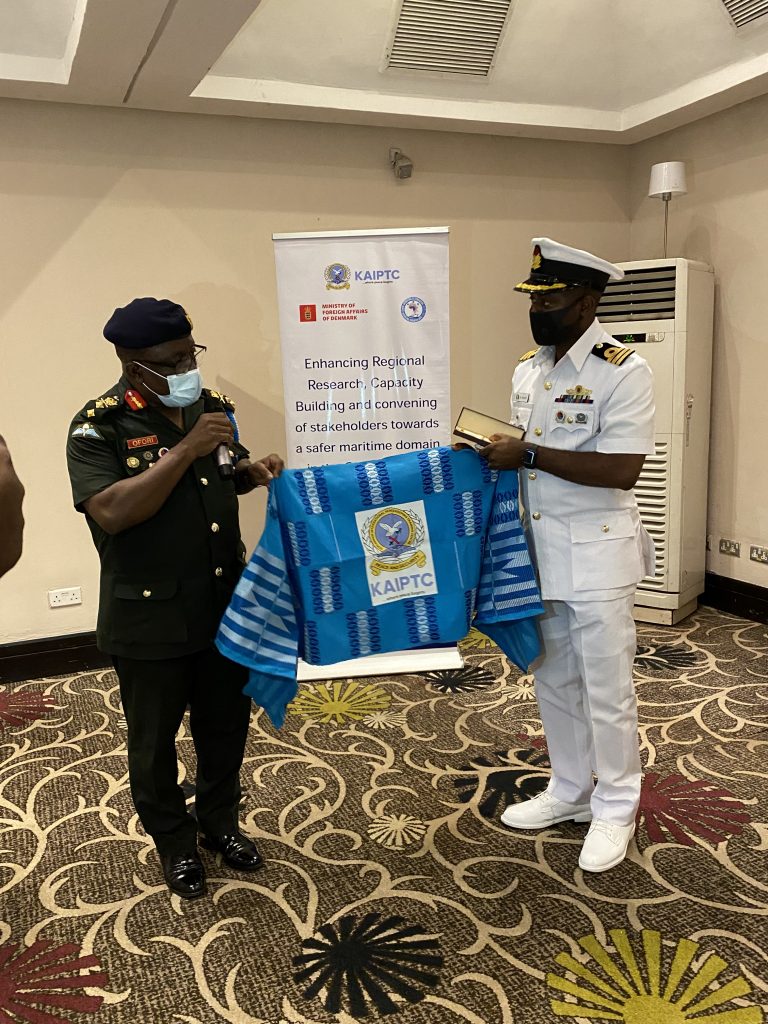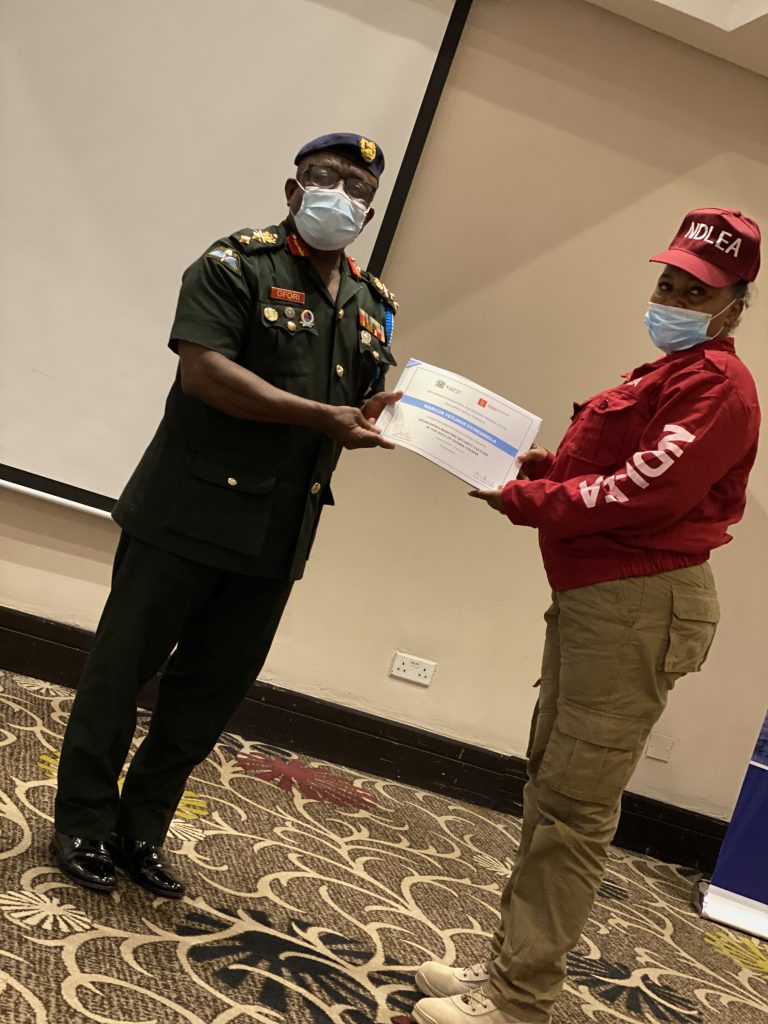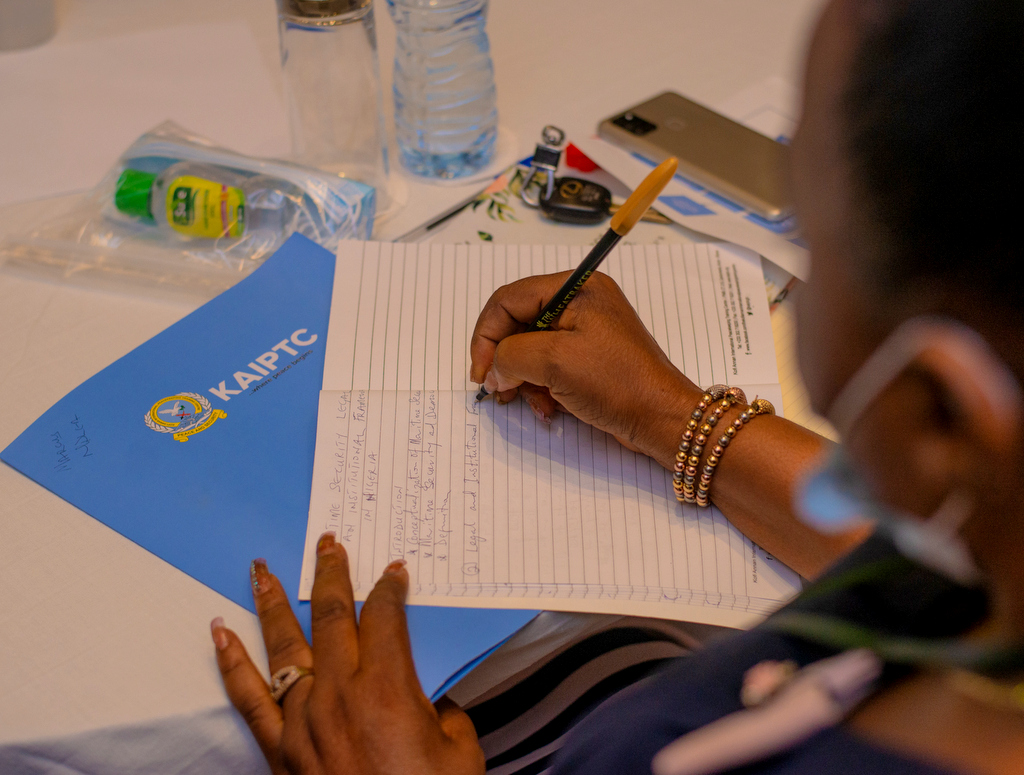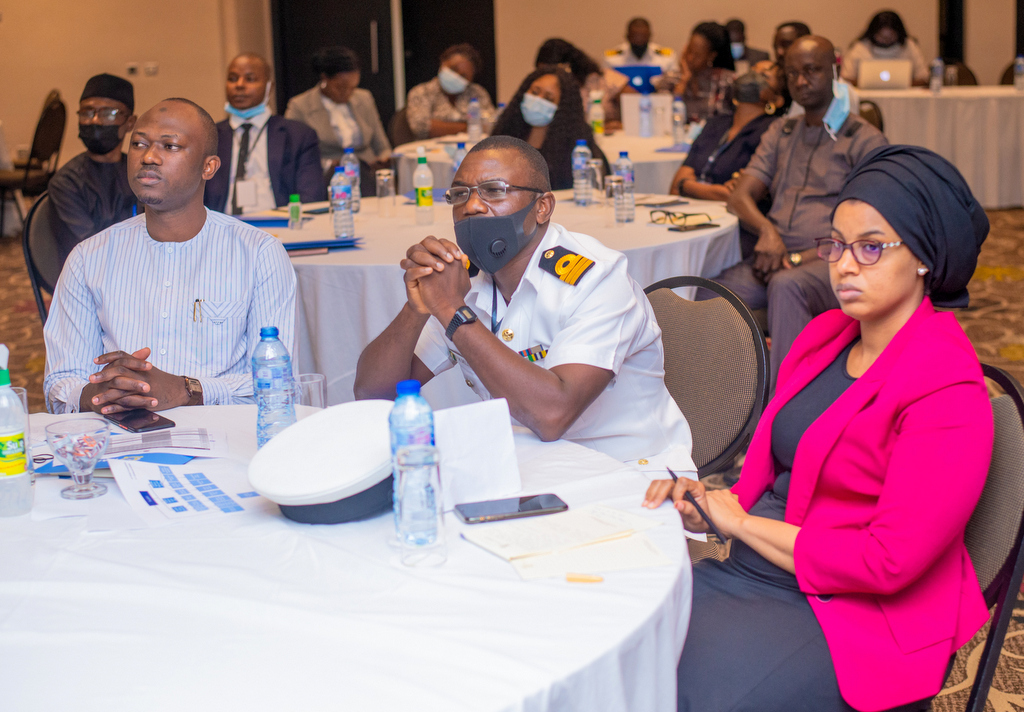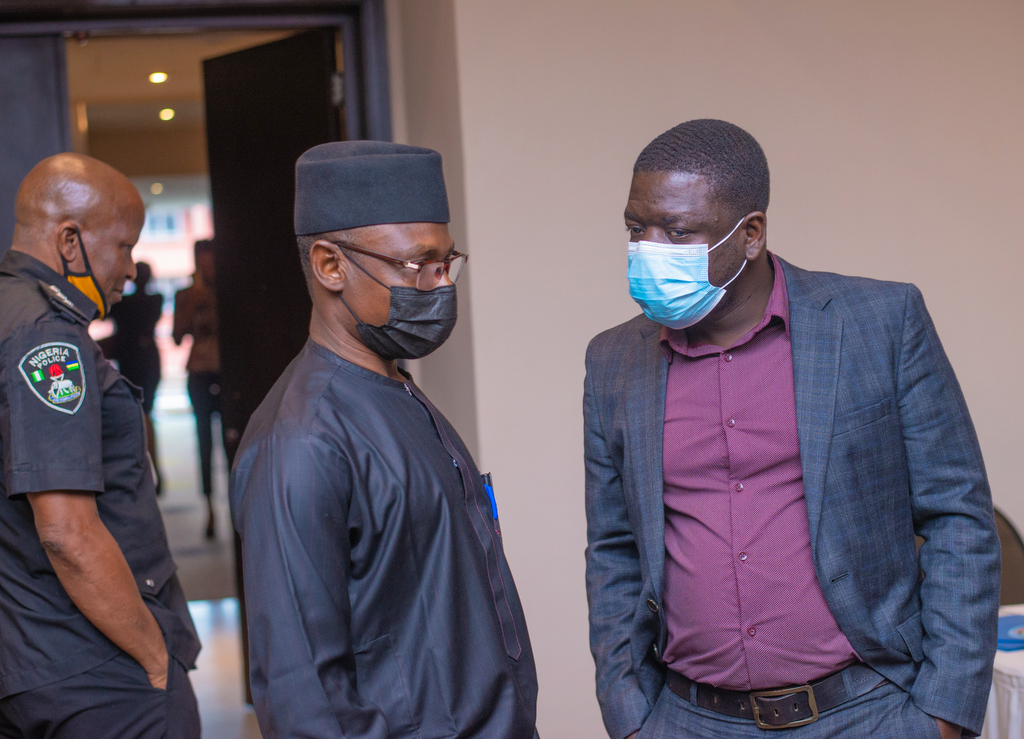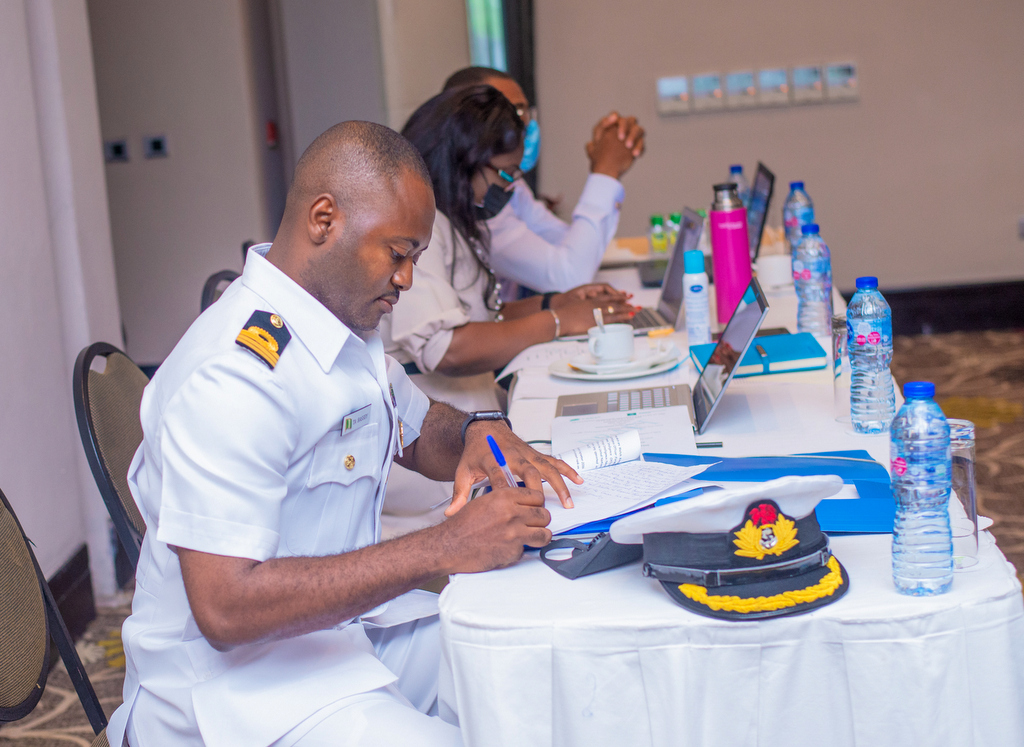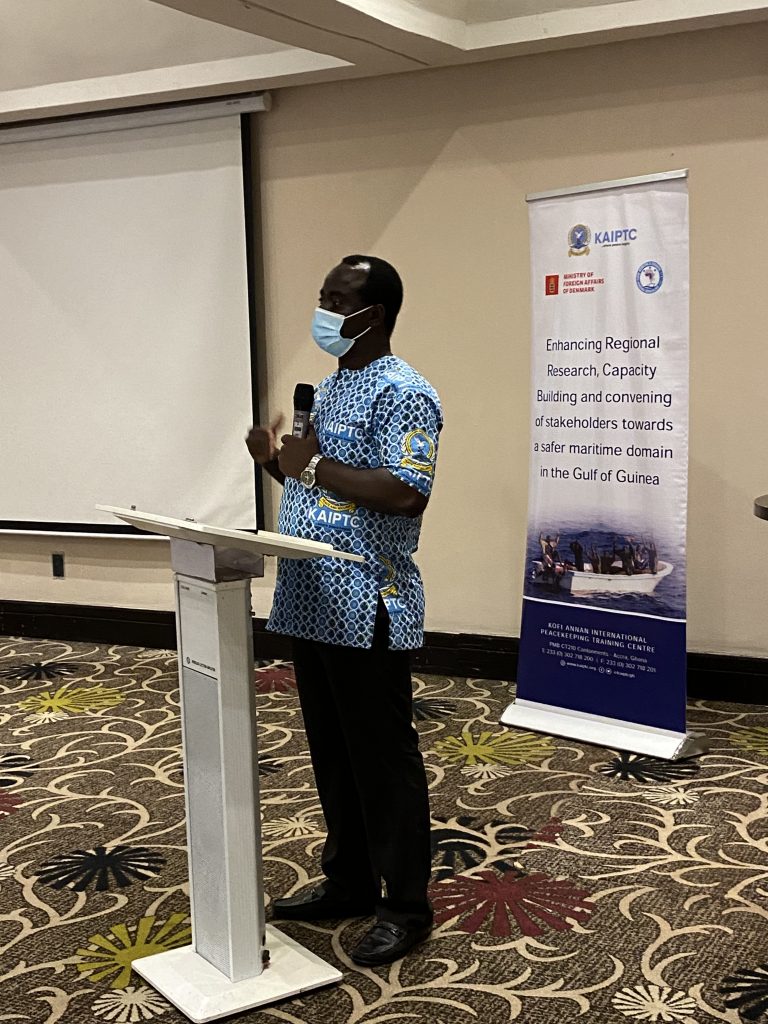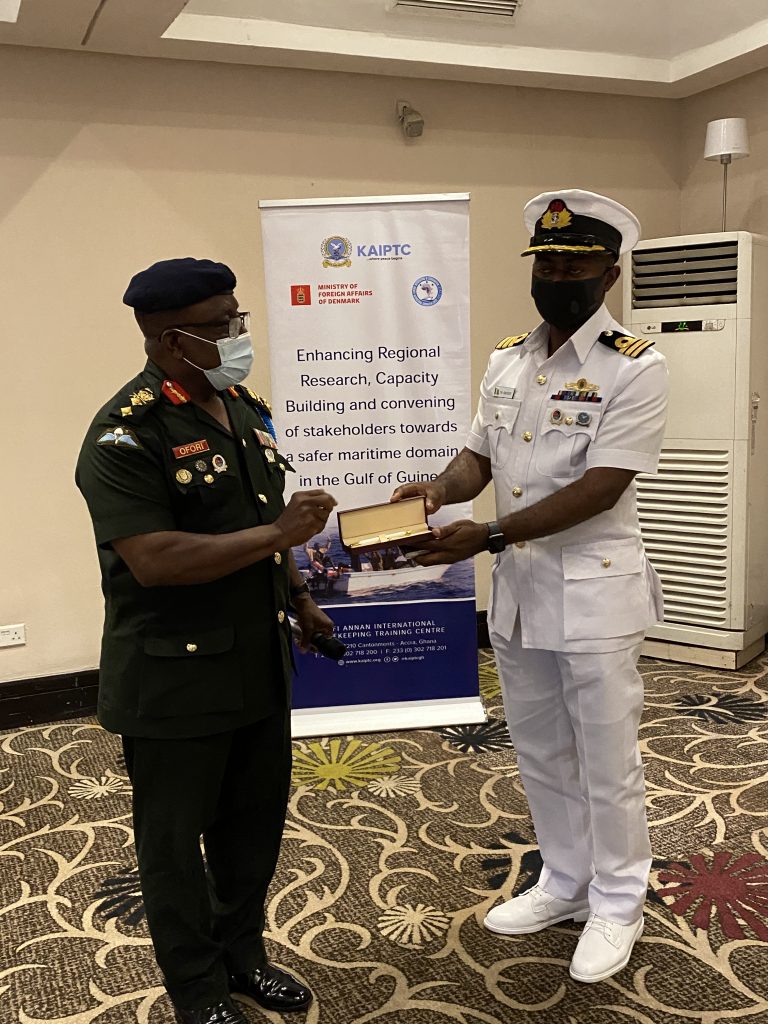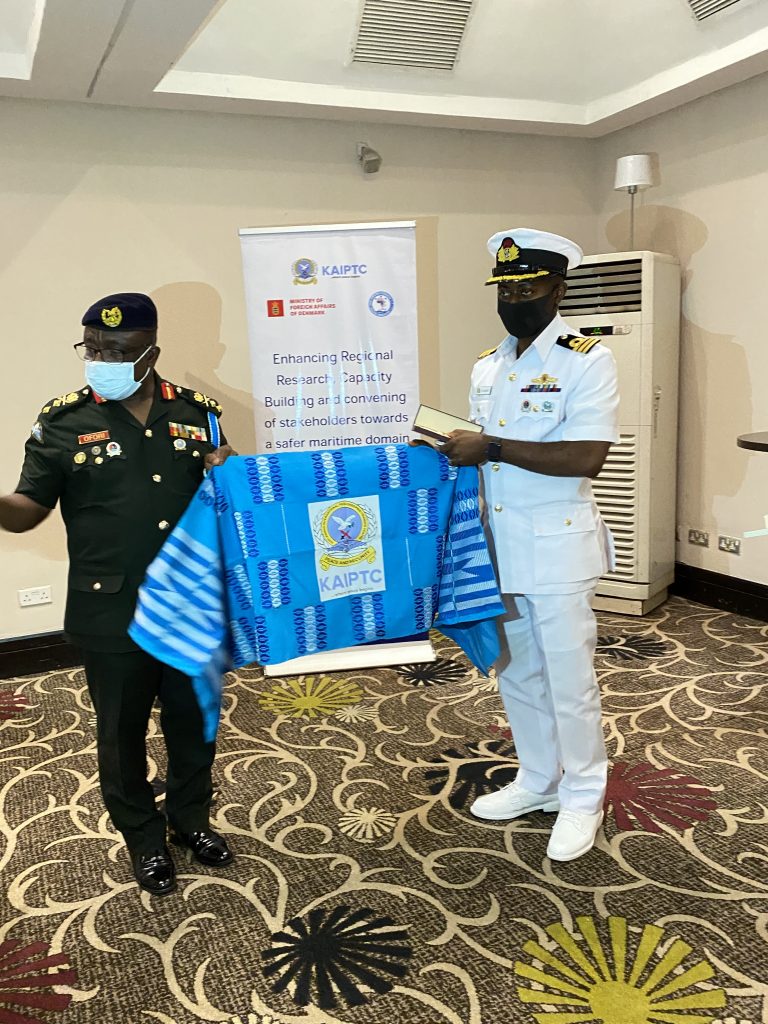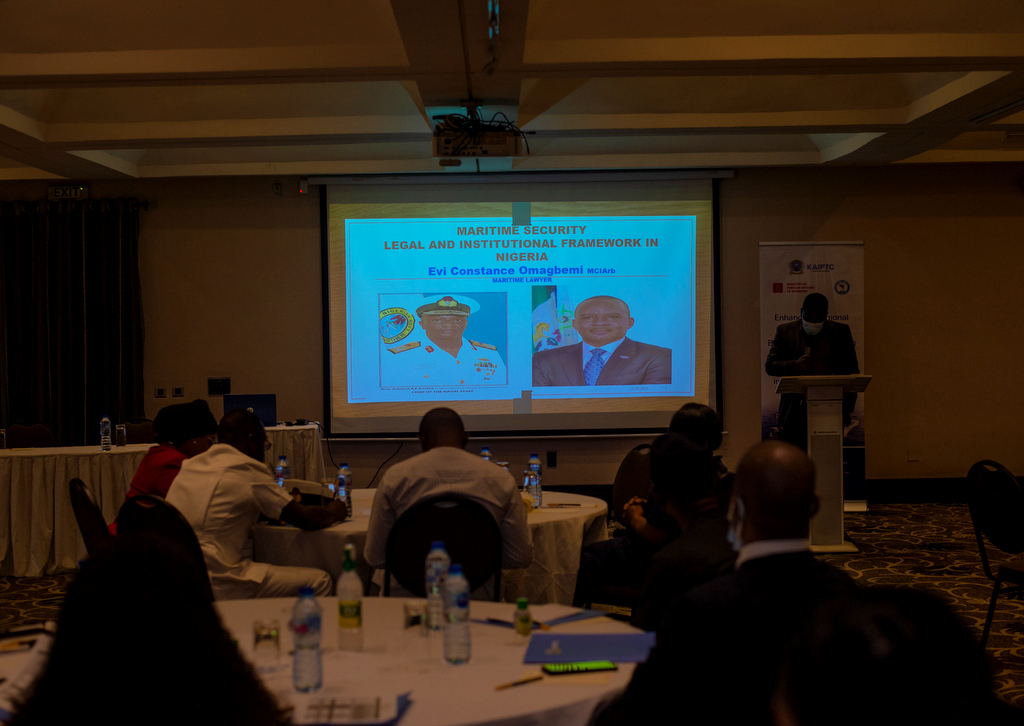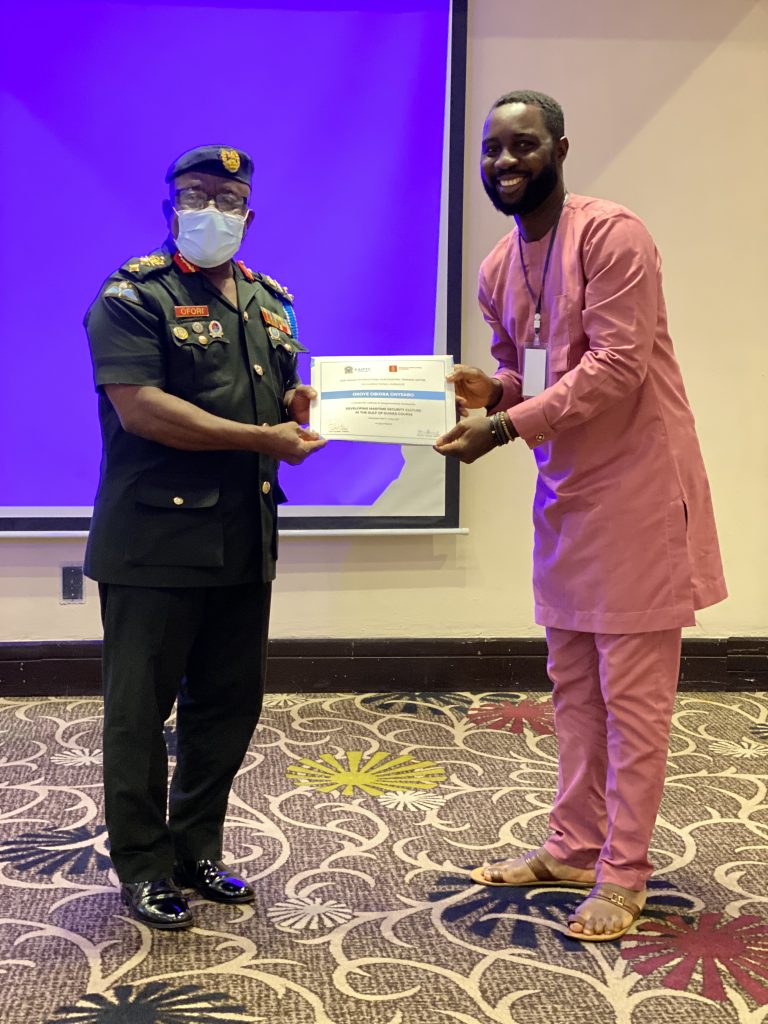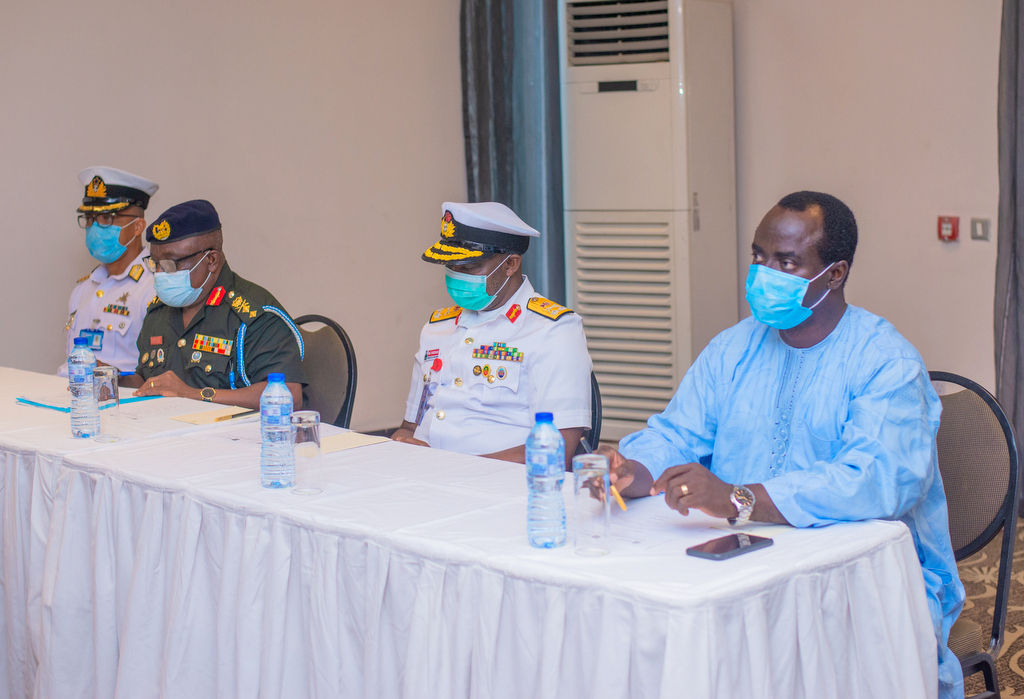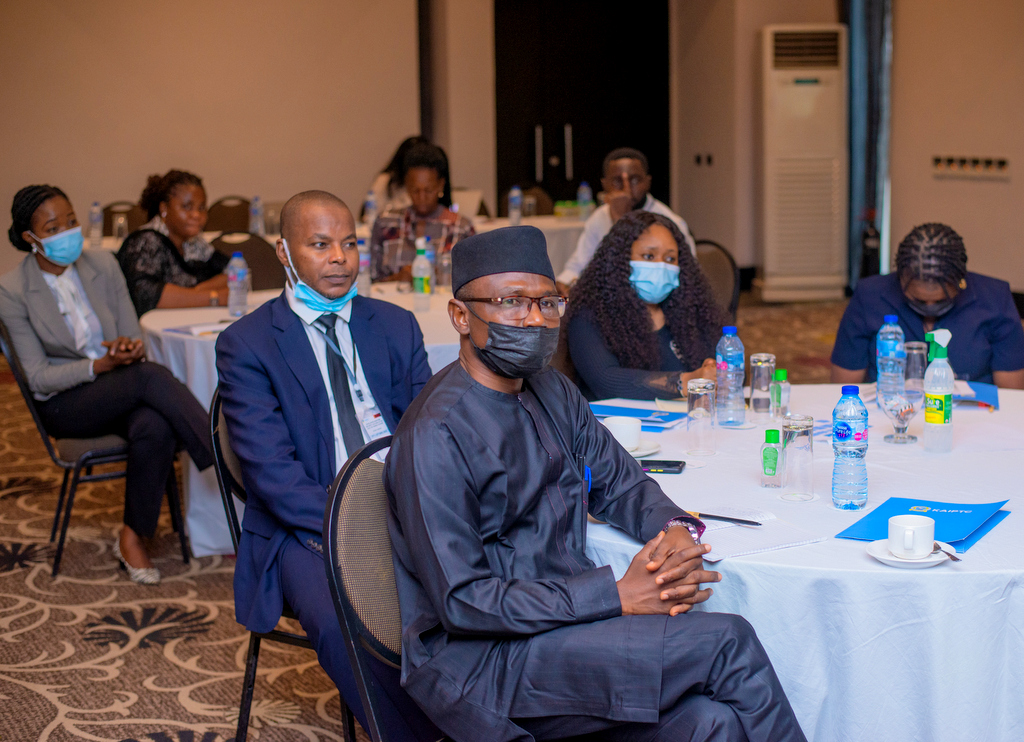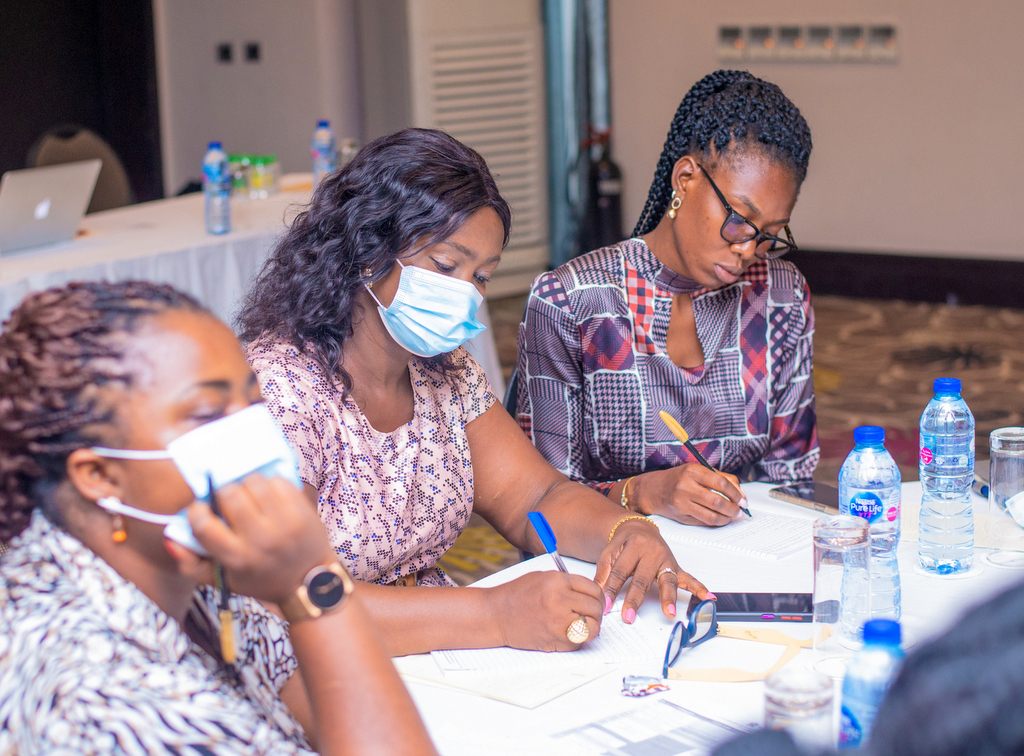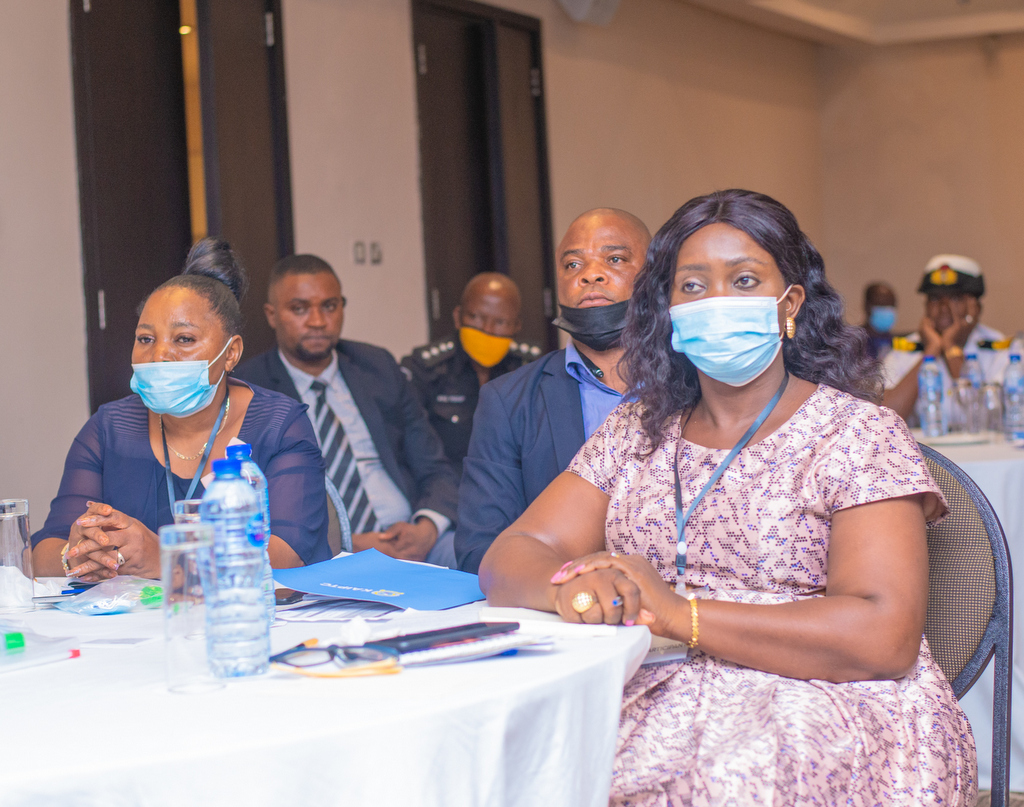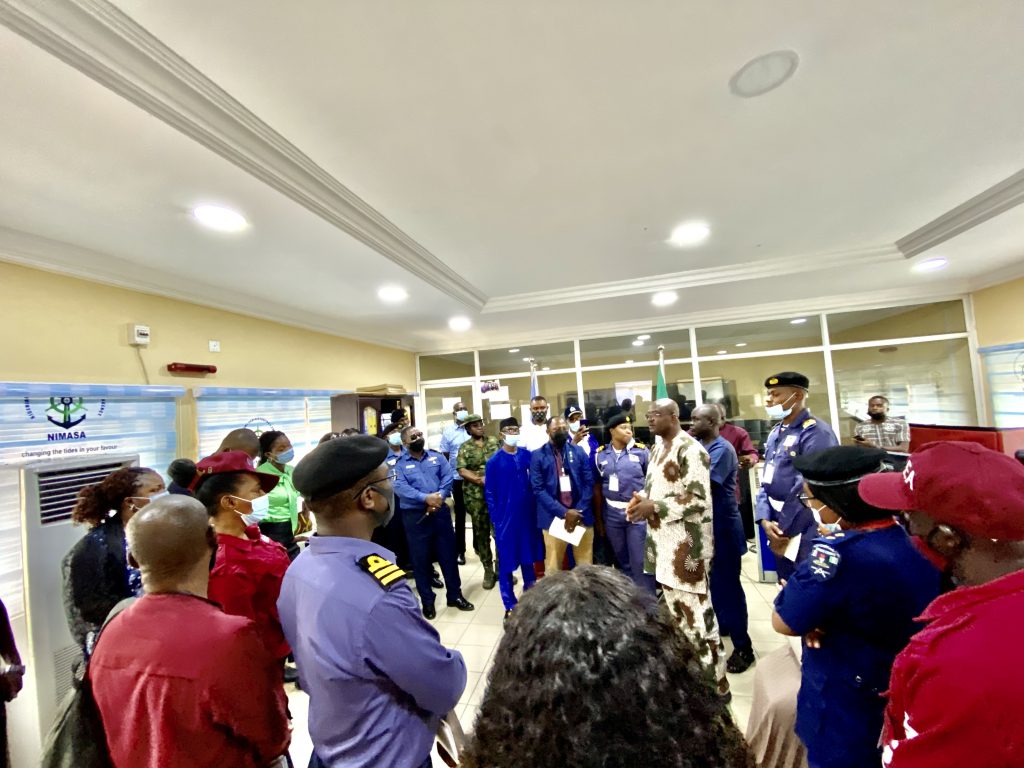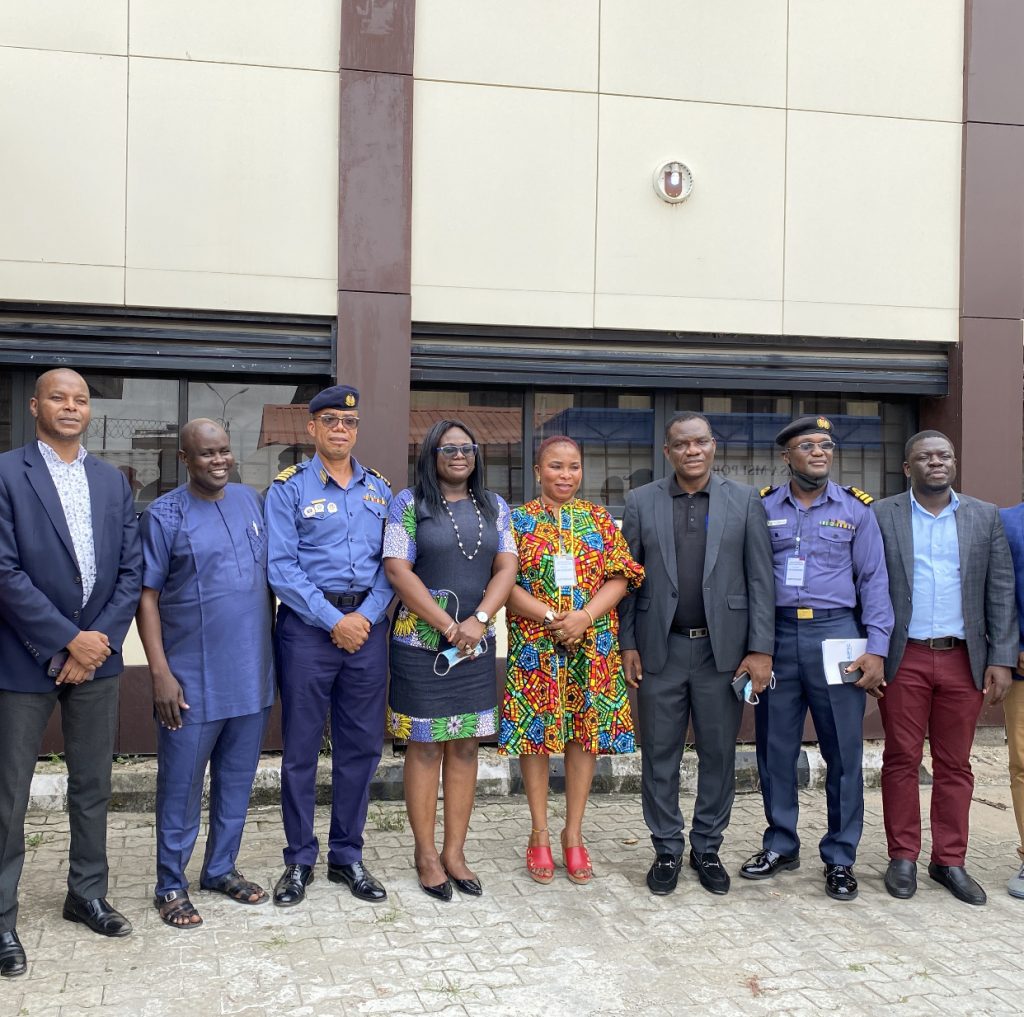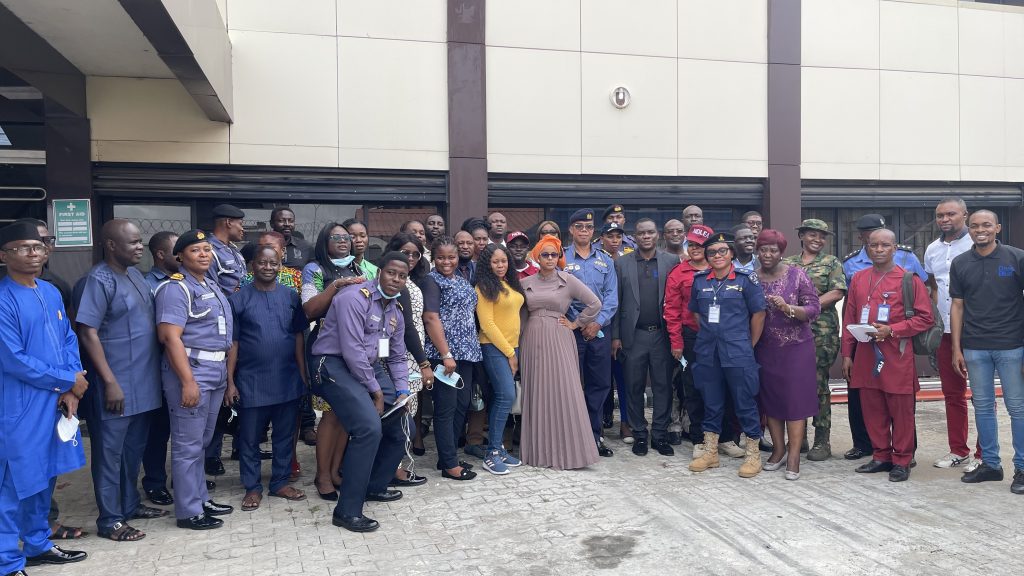From 17th to 21st May 2021, The Kofi Annan International Peacekeeping Training Centre (KAIPTC) conducted the Developing Maritime Security Culture in the Gulf of Guinea Course for Nigerian maritime actors at the Wheatbaker Hotel in Ikoyi, Lagos in Nigeria. This activity constituted the fourth training under the capacity building component of the project on “Enhancing regional research, capacity building and convening of stakeholders towards a safer maritime domain in the Gulf of Guinea” which is being implemented by the KAIPTC in collaboration with the Government of Denmark.
The objective of the training was to equip participants with current knowledge and skills on regional and national maritime security arrangements and the importance of information sharing, collaboration and cooperation in enhancing security in the Gulf of Guinea maritime domain. For the first time on the successive training courses organized, the gender imbalance was in favor of the women. Of the thirty-one (31) personnel who participated in the training, 15 (48%) were male and 16 (52%) female. Participants were drawn from 16 different agencies which included the Nigerian navy, Nigerian Maritime Administration and Safety Agency (NIMASA) Ministry of Justice, Nigerian Ports Authority, National Agency for Prohibition of Trafficking in Persons (NAPTIP), Economic and Financial Crimes Commission (EFCC) National Drug Law Enforcement Agency(NDLEA) and the National Oil Spill and Detection Agency (NOSDRA), Marine Police among others. The training created the platform for personnel from these agencies to exchange views on regional and national maritime issues, discuss maritime subjects of common interest and deliberate on measures that can be implemented to enhance cooperation and coordination in national and regional maritime enforcement activities.
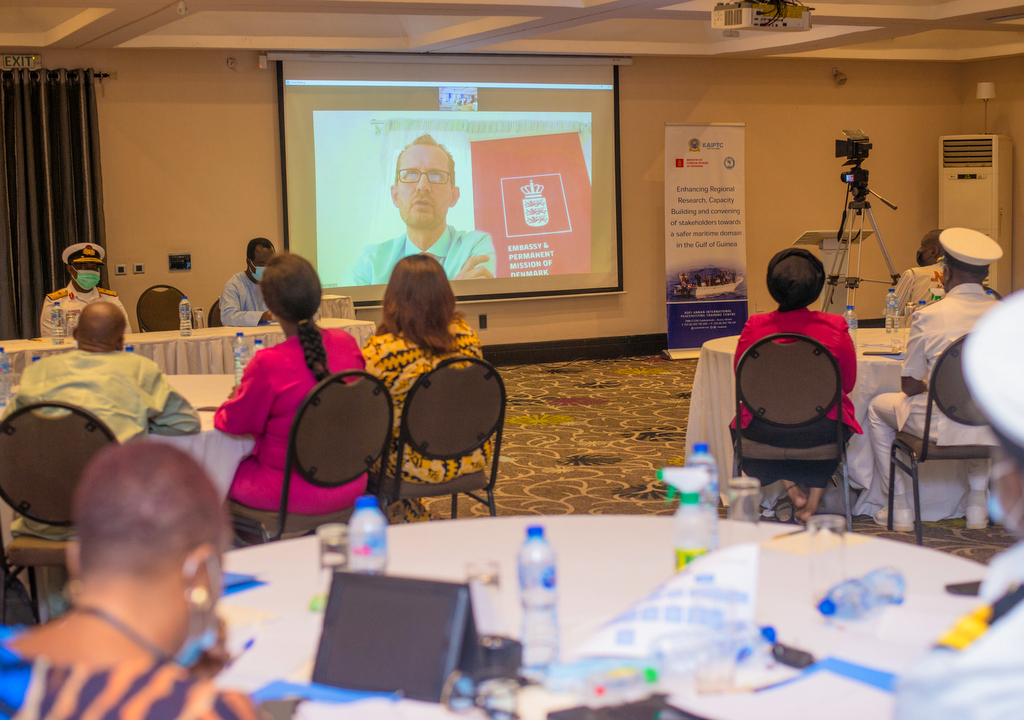
At the opening ceremony were Major General Francis Ofori, Commandant of the KAIPTC, His Excellency Jesper Kamp, Danish Ambassador to Nigeria (who joined the ceremony via zoom) and Rear Admiral Monday Kohwo Unurhiere, Chief staff Officer, Naval Training Command. In his address, Rear Admiral Unurhiere welcomed participants and dignitaries present to the 5-day course, emphasizing the importance of the course in contributing to maritime security in the Gulf of Guinea. He mentioned that lack of maritime domain awareness means that it can be an uphill struggle to gain political attention or resources for revising maritime security policies and capacity building. In light of this, he expressed excitement about the potentials of the training to draw attention to the crucial role of cultural considerations to maritime security governance. He ended his welcome address by thanking the Government of Denmark and the KAIPTC for providing the platform to strengthen law enforcement capabilities relative to Nigeria’s maritime environment.
The Danish Ambassador to Nigeria, His Excellency Jesper Kamp in his keynote address stated that with the current maritime security challenges being experienced in the region, meetings among maritime security actors have become very crucial, as they offer the platform to deliberate on measures contributing to enhanced maritime security in the Gulf of Guinea. Referring to the changing dynamics of piracy and its effects on the economies of GoG countries, Ambassador Kamp stressed on the need for enhanced and coordinated approach from the region’s maritime actors to effectively respond to these maritime security challenges. He therefore advised the participants to apply the knowledge they will acquire through the training to improve the important roles they are playing in their various capacities to support maritime security initiatives both at the regional and the national level. In concluding, the ambassador emphasized the commitment of the Danish Government to support national and regional activities aimed at improving security in GoG waters, citing the appointment of the Danish Special Representative for Maritime Security as an example.
Major General Francis Ofori, the Commandant of the KAIPTC, remarked that the Gulf of Guinea region was at a critical juncture in its socioeconomic and political development because though endowed with huge resources and potential, it is confronted with myriad challenges such as maritime piracy and crimes. Referencing the rescue of the Hailufeng 1 in May 2020, the Commandant advised the participants on the need for timely reporting of incidents, improved information sharing and increased collaboration between maritime response authorities since it can contribute to reduction in the risk of maritime insecurity in the Gulf of Guinea.
During the 5-day training, participants were taken through 8 modules by a cross section of experienced facilitators from the navy, legal and the academia. As much as practicable, the training utilized Nigerian facilitators to ensure local context and knowledge of the maritime environment in Nigeria. For instance, a session on Nigeria’s anti-piracy laws ensured that participants were up to date and abreast with the provisions of their legal frameworks. The session on inter-agency collaboration ensured that all agencies present improved their appreciation of the various actors at play in the maritime domain in the Gulf of Guinea and set the stage for greater collaboration in future. The presentations also sought to imbue participants with knowledge and understanding of maritime insecurities in the GoG, current norms and threats to maritime security in the Gulf of Guinea.
One of the highlights of the training was a visit to the Nigerian Maritime and Safety Agency (NIMASA) where participants were briefed on Nigeria’s Deep Blue Project (DBP). This is an integrated national security and waterways protection infrastructure, aimed at comprehensively addressing insecurity and criminality in Nigeria’s territorial waters and exclusive economic zone. By providing effective surveillance of the country’s waters and coordinating responses to piracy and other maritime crimes, the DPB hopes to reduce maritime criminality. The DBP also adopts an interagency approach in its operations and has acquired a number of assets that will help in its work.
The 5-day training came to an end on Friday, 21 May 2020. After the presentation of certificates to participants, the head of the Conflict Management Programme (CMP) of the KAIPTC, Mr John Pokoo in his remarks advised participants to use the knowledge acquired to strengthen their working relationship with their colleagues in other agencies to enhance maritime security in Nigeria.
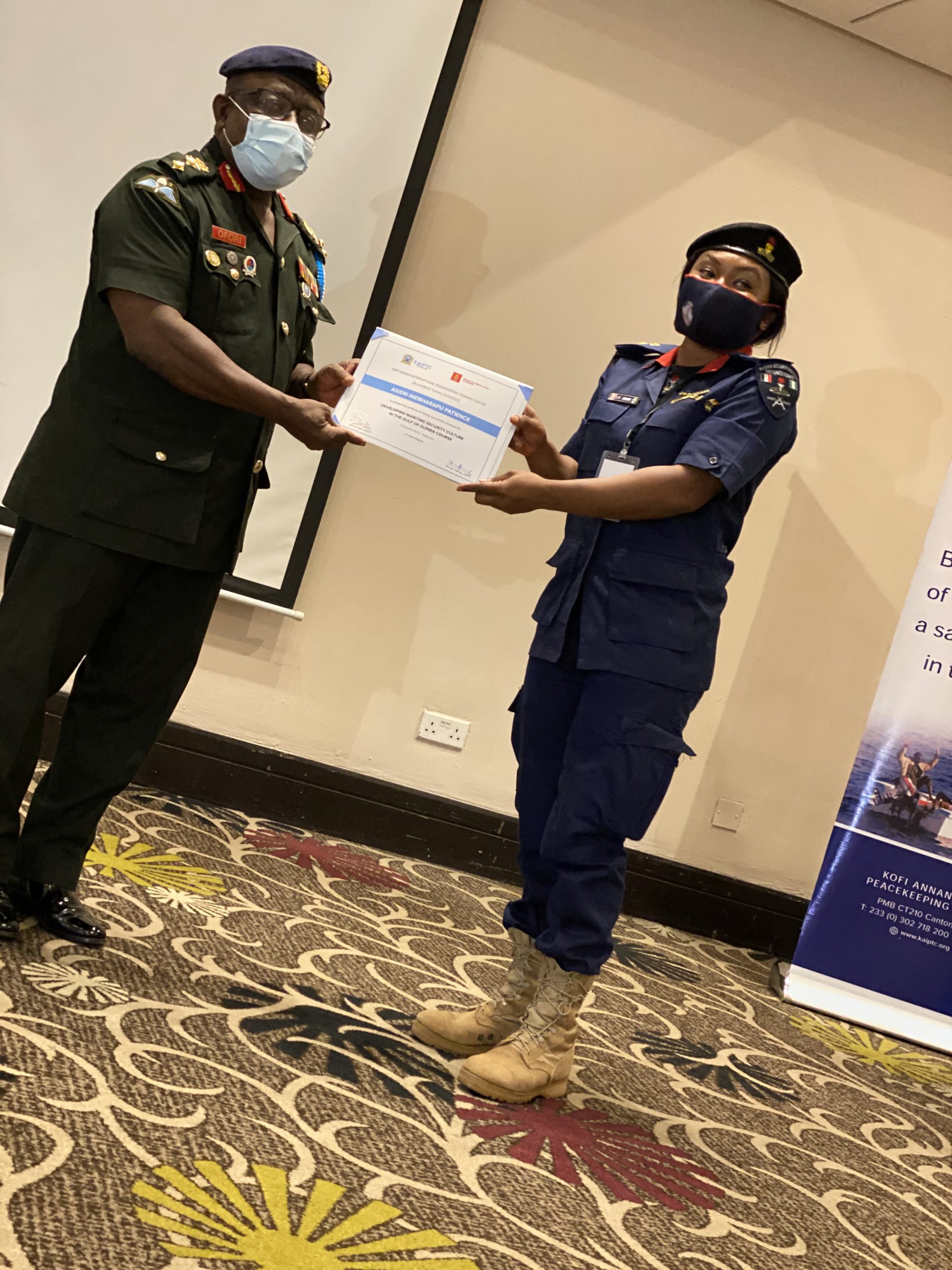 The Commandant of the KAIPTC in his closing speech noted that the diverse mix of institutions who participated in the training depicts the synergies and alliances that are needed towards reducing maritime insecurity in the Gulf of Guinea. He therefore advised the participants to continue to network, share ideas, reach out to each other, develop SOPs to streamline their actions with each other and find innovative solutions to dealing with challenges in their respective fields to ensure safety and security in Nigeria and Gulf of Guinea in general.
The Commandant of the KAIPTC in his closing speech noted that the diverse mix of institutions who participated in the training depicts the synergies and alliances that are needed towards reducing maritime insecurity in the Gulf of Guinea. He therefore advised the participants to continue to network, share ideas, reach out to each other, develop SOPs to streamline their actions with each other and find innovative solutions to dealing with challenges in their respective fields to ensure safety and security in Nigeria and Gulf of Guinea in general.
Reflections from Participants
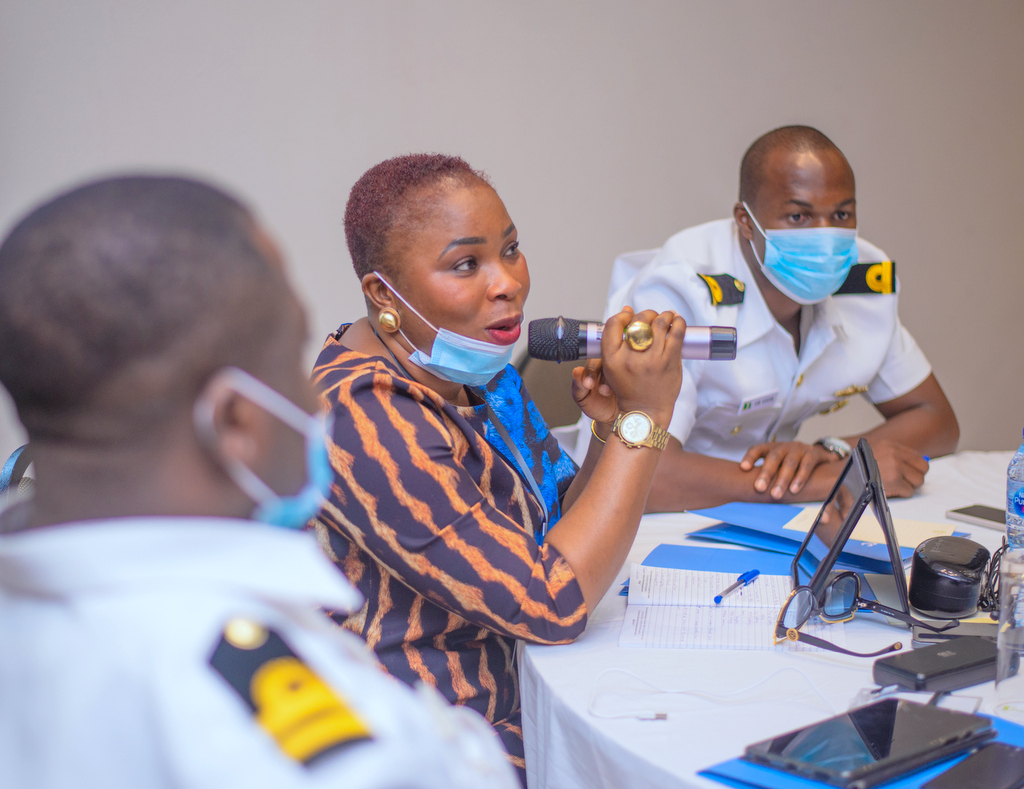
The menace of oil theft and artisanal refining activities lead to destruction of the environment, both marine and onshore. Lessons learned as well as the inter-Agency linkages developed will assist my Agency to strengthen our ongoing efforts in combating artisanal refining and hence, environmental damages, both at the strategic and tactical levels. – Participant, National Oil Spill and Detection Agency (NOSDRA)
I intend to advise my administrative authority to synergize with other relevant ministries, departments and agencies while performing their constitutional role – Participant, Nigerian Navy
I will report back to my State Commandant and recommend ways to promote collaboration with all agencies to combat all forms of maritime crimes and to boost the capabilities and readiness of men of the corps at all times. I will also propose a training course, in a bid to share my knowledge, on maritime crimes, the effect and the need to storm it. – Participant, Nigeria Security and Civil Defence Corp (NSCDC)
The training organized in Nigeria was timely as the country’s maritime authorities are instituting measures to enhance collaboration and cooperation among maritime security actors and agencies. The training thus presented a platform where personnel from the major maritime agencies deliberated on measures that can be implemented to improve collaboration, cooperation and information sharing and overall security of the country’s waters. Feedback from the training participants shows how the course enlightened them on the overall security situation in the Gulf of Guinea and the regional and national arrangements put in place to ensure maritime security in the Gulf of Guinea. With the course informing participants on the role they can play to support the implementation of national and regional maritime security initiatives, they reported on how they will apply the knowledge acquired from the training to support the country’s efforts in promoting maritime security.
